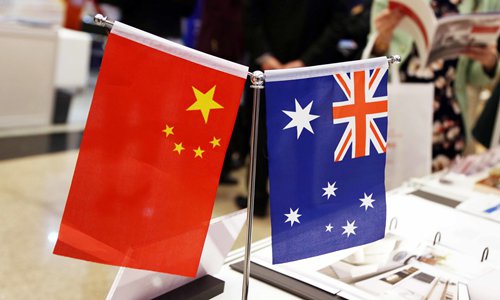Firms should shore up competitiveness amid poisonous environment created by Aussie politicians
By Guo Chunmei Source:Global Times Published: 2020/5/14 23:12:35

File photo
With some Australian media and politicians stirring up a hostile atmosphere, the nation's relationship with China has recently slid to a near freezing point. It is ironic that Australia values the Chinese market, but consistently opts to sabotage bilateral relations. Shoring up their competitiveness and irreplaceability is now critical for Australian firms in the Chinese market if they are to survive the poisonous environment created by their own politicians.By launching politicized propaganda concerning the COVID-19 pandemic and China's recent suspension of meat imports from four Australian firms, Australian media and politicians have been risking the long-term interests of domestic firms and the country's global reputation.
Chinese customs have detected repeated violations of inspection and quarantine requirements by some Australian exporters and elected to suspend imports from four firms to safeguard Chinese consumers' health and safety.
Recently, certain politicians have claimed to use the Darwin Port in northern Australia, which benefits from private Chinese investment, as a bargaining chip in response to China's meat import suspension. As a country that has boasted of its free trade, Australia should resume sense and rationality to get back on track, shoring up the competitiveness of its goods and services rather than clamoring for China's "economic punishment."
China's huge meat consumption market is widely coveted by global exporters. Russia shipped an export of 21.4 tons of beef to China on May 3, and China lifted its 19-year import ban on certain US beef in February, according to media reports.
There are varied choices for Chinese consumers nowadays. Australia needs to focus on enhancing its own competitiveness and winning Chinese consumers' preference and trust.
China's anti-dumping investigation into Australian barley was a normal investigation based on market principles and laws which was launched in 2018. By continually misrepresenting the investigation, Australian politicians are seemingly trying to hinder any improvement in the China-Australia relationship.
The two nations' economies are complementary. Over the past two decades, China's rapid industrialization has drawn massive demand for Australian resources, and China's constantly expanding middle class has created huge demand for Australian wine, dairy products and services.
China has been Australia's largest trading partner since 2009. As the top export destination for Aussie goods, China purchased roughly 30 percent of Australia's total exports in 2019.
Though bilateral relations have seen fluctuations in recent years, the two countries' trade has been increasing, which shows China has been following market principles. Australia's exports to China did not drop even in the first quarter when both countries had implemented virus prevention measures.
And during the 2008 financial crisis, Australia was the only developed "Western" economy which did not enter recession. That was largely due to its economic and trade ties with China.
Some Australians have worried over the country's reliance on China and have tried to expand trade to countries such as India. Though India also has a large population, its consumption ability cannot compare with China's.
Moreover, it is not necessarily a bad thing that Australian firms develop a reliance on the Chinese market, one of the largest consumption markets in the world and an ideal destination for all exporters.
As COVID-19 continues to rip through the world, the escalation of China-Australia tensions will not only impact the two nations, but will cast a shadow on the whole Asia-Pacific region. Only through cooperative efforts can the two countries and the region recover and survive the daunting future of the global economy.
The author is an expert on Australian studies at the China Institutes of Contemporary International Relations. bizopinion@globaltimes.com.cn
Posted in: EXPERT ASSESSMENT